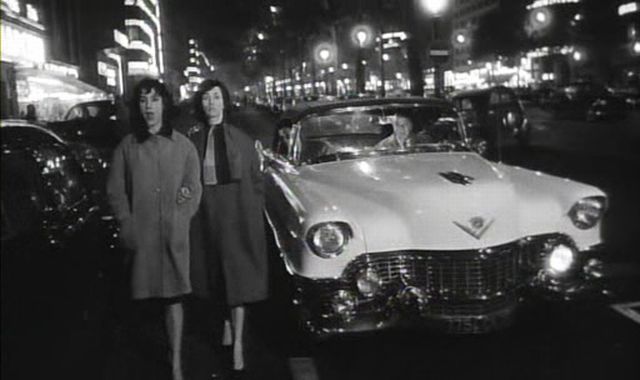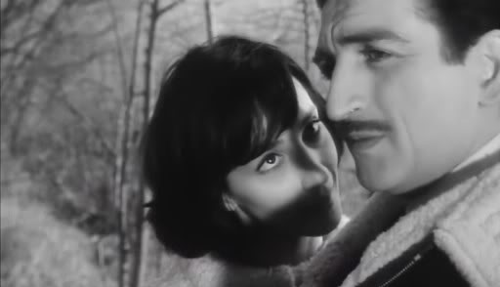Swinging the pendulum deftly between various moods -- documentary-like observation, gender comedy, absurd comedy, tragedy and finally, quiet transcendence -- Chabrol's film shows a careful narrative structure and a formal beauty that really gripped me. This is my first Chabrol film and I come to it already familiar, though not overly enamored, with the other early touchstones of the French New Wave: The 400 Blows (Francois Truffaut, 1959) and Breathless (Jean-Luc Godard, 1960). This is a really beautiful and unique film that is made so rich mostly because Chabrol's keen interest in human interaction, spoken and unspoken.
A delicate portrait of city women and a searing subversion of romanticism, Chabrol follows four Parisian girls in their early 20's over the course of a handful of days and nights, though it is the stories of Jane and Jacqueline that get the lion's share of the focus. Both of these women are intensely romantic, though in opposite ways. Jane embraces the romanticism of choice, freedom, being unencumbered, being her own woman; Jacqueline embraces the more conventional romanticism of being swept off her feet by a man who loves her deeply. Over the course of the film, their romantic notions will be thwarted as the men who drift through their lives upend their dreams of freedom and love.
Jacqueline and Jane are walking home one evening when they are suddenly stalked very persistently by the ostentatiously lighthearted duo of Marcel and Albert. They are nothing more than guys looking for a good time and though they seem charming and entertaining early on, over the course of the evening they become increasingly callous and demanding of Jane, who is far more accommodating than Jacqueline. Eventually, she is in their apartment and expected to be sexually involved with both men. Chabrol, though ultimately sympathetic to the women who are at the mercy of men in power, still sees a paradoxical conflict where Jane's own freedom of choice has brought her to this compromised state. When Jane returns to her apartment early the next morning, we get the unfortunate feeling that she had to involuntarily give into at least some of the men's demands. She is not in the mood to discuss with her roommate anything that happened.
One of the key scenes is the night at the swimming pool, a scene where every major character (apart from Mr. Balin) is present. It starts as a lighthearted jaunt that slowly turns into a aggressive assault of masculine dominance in its good and bad forms. Marcel and Albert happen to be at the pool too, where Jane, Jacqueline and the rest are enjoying their evening. The two men quickly start teasing Jane into introducing them to their party and find that she has become significantly less accommodating since the last time she was with them. Quickly, things deviate into a prankish show of disapproval, where Marcel and Albert throw all the others into the pool and start dunking them all under water. Jane and Jacqueline obviously get the brunt of the dunking in what has quickly shifted from good-natured prank into psychological torture. Chabrol notes this shift in tone by shifting his camera angle, showing us underwater shots of Jacqueline being pushed under, matched with muffled underwater audio. Finally, we get our relief in the form of Andre, who dives in from the high dive to swim over and rescue Jacqueline from her peril. The two men, now emasculated and embarrassed, back off as Andre becomes the hero of the scene and the wish fulfillment of Jacqueline, who has noticed him stalking her recently.
At this point, it seems Chabrol has brought us full-circle into a traditional (though slightly unconventional) romantic film, as Andre and Jacqueline are quickly away into the countryside, sharing a meal together where Andre proves himself to be a jokester himself, full of little tricks that amuse the enamored girl. He takes them on a walk in the woods that slowly becomes more and more uncomfortable, until finally we are given an ambiguous moment of consummation, as the two lay together in an isolated area as the birds around them call out rhythmically. Chabrol finally lets us in on what is happening (having alluded to it so obviously earlier with Andre's own inquisition -- though as a hopeful optimistic, I disregarded it) as we see that Andre is strangling Jacqueline, whose squirms were not the happy writhing of passion but the desperate movements of anguish.
Andre leaves the scene quite hurriedly and we are never afforded an answer to his mystery. Why was he following her? Why did he want to kill her? Did he know anything about her at all? Instead, Chabrol takes us into a dance hall where a young woman is being asked to dance by a young man. We cannot see the man's face because we are left with the gaze of the young woman, who literally locks eyes with us and is intercut with the slowly changing angle of the glistening mirror ball above them. The metaphorical fractured beauty of the ball is now a frustrated thing, not giving us narrative or sentimental satisfaction, but a vignetted series of dots that clutter the atmosphere and highlight how bright the light could be if it were just focused. The romanticism that seemed so certain only ten minutes prior has now been unfairly shattered, and we are left with a moment to ponder the frustrating reversal as we experienced the fulfillment of our greatest fears rather than our greatest dreams. It is a strange moment of transcendence.


No comments:
Post a Comment